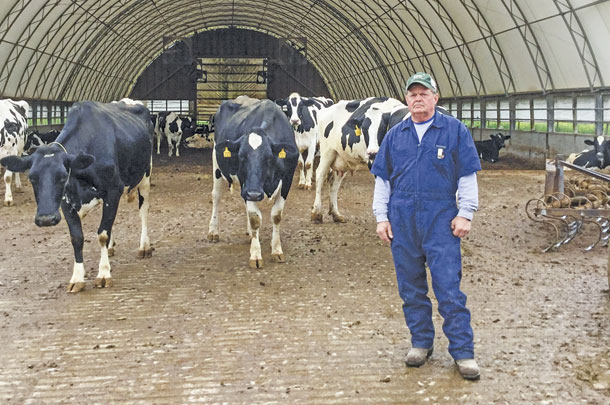During the last year, the topic of trade policy has been part of nearly every major political discussion, both on the 2016 campaign trail and on Capitol Hill. For America’s dairy community, the conversation about our trading relationships closest to home is a tale with two very different perspectives that run counter to the commonly heard narrative suggesting our biggest challenge lies south of the border rather than north.
The North American Free Trade Agreement (NAFTA) has become the focal point of discussion about the future of America’s trade relations and, at the end of April, President Trump suggested the U.S. was preparing to withdraw from the 25-year-old agreement.
While that now appears unlikely to happen, the agreement among the U.S., Canada and Mexico is almost certain to be revised in the coming years.
As this process commences, the National Milk Producers Federation (NMPF) is emphasizing two key points on behalf of America’s dairy farmers: We need to preserve what’s working – our relationship with Mexico, the U.S.’s number one export market for dairy products.
We need to fix what’s not working – our relationship with Canada, whose new milk pricing policy will create huge problems for the global dairy market and U.S. farmers.
For more than a year, NMPF and other U.S. dairy groups, including the U.S. Dairy Export Council, have repeatedly raised concerns about Canada’s efforts to undercut competition from the U.S. Starting in Ontario and then more recently moving to other provinces, Canada has created a new national ingredients strategy that gives unfair pricing advantage to its domestic milk ingredients, in an obvious effort to close the door on imports of U.S. ultra-filtered milk.
This has resulted in lost markets for companies in Wisconsin and New York, and dozens of dairy farms were faced with the prospect of no longer having a market to sell their milk.
Making matters worse, this scheme also enables Canada to dump excess dairy proteins onto world markets, posing a much larger and longer-term threat beyond the loss of markets to just a few dairy suppliers. Our dairy farmers rely on global milk powder markets, and a new source of unfair competition makes this a national concern.
And that concern extends beyond our borders, as countries including Australia and New Zealand have joined our call for Canada to rein in its export subsidies.
NMPF has asked Trump administration officials, members of Congress and dozens of governors to fight such protectionist trade policies. These engagement efforts recently bore fruit when, during a speech in Wisconsin in mid-April, President Trump chastised Canada for its pricing policy, calling the resulting impact on U.S. farmers “unfair” and “a disgrace.”
Many other political leaders, including House Speaker Paul Ryan and Senate Minority Leader Chuck Schumer, have also echoed this sentiment in public comments. In late April, 68 members of the House wrote to the president about the issue, reinforcing NMPF’s message that this is a situation affecting farms beyond just those in Wisconsin, Minnesota and New York.
While our strained relationship with Canada has made recent headlines, the most important NAFTA relationship for U.S. dairy is with Mexico. In the 25 years since NAFTA was signed, Mexico has become our most important trading partner and a big reason why U.S. exports have reached 15 percent of our annual production.
We’ve long communicated our commitment to this relationship with our Mexican dairy counterparts. Most recently, in mid-March, Tom Vilsack of the U.S. Dairy Export Council and Michael Dykes of the International Dairy Foods Association joined me in visiting Mexico City to reinforce our industry’s commitment to this relationship.
Even as some are calling for an end to NAFTA, we have reminded its critics that the agreement has had positive benefits as well. The U.S. sold $1.2 billion worth of dairy products last year to customers in Mexico, amounting to nearly one-fourth of total U.S. exports.
Those exports create approximately 30,000 U.S. jobs and $3.6 billion in U.S. economic impact. NMPF has insisted and will continue to insist any renegotiation of NAFTA preserves this vital trade relationship.
For now, our trade policy priorities with NAFTA represent two very different sides of the same coin. Mexico has been a strong and fair partner with the U.S. – but not Canada. When a sudden change in Canadian trade policy has so clearly led to a lost market for U.S. producers, we cannot deny how interconnected our industries have become.
This connection was built with a commitment to fair trade, and we will continue to insist on that from our northern neighbors. ![]()

-
Jim Mulhern
- Chief Operating Officer
- National Milk Producers Federation
- Email Jim Mulhern
Board member profile
George Rohrer

Rohrer joined the NMPF board of directors four years ago, representing Dairy Farmers of America. As a board member, he has a hand in influencing policy areas affecting dairy, including federal farm bills, trade and immigration. Rohrer has been involved in dairy farming for more than 40 years and owns his farm with his brother.
Located in Dayton, Virginia, their farm milks 120 Holsteins in a double-5 herringbone parlor, with a stall and bedded pack barn. Through his membership with DFA, Rohrer is on the cooperative’s Southeast council and its board of directors. He is also a board member of the United Federation of Dairy Herd Improvement Association (United DHIA).
He was honored with Virginia Tech’s 2010 Distinguished Dairyman of the Year Award and also the 2008 Shenandoah Valley Soil and Water Conservation District Clean Water Farm Award.
PHOTO: George Rohrer. Courtesy photo.
The following update is provided by National Milk Producers Federation (NMPF), based in Arlington, Virginia. NMPF develops and carries out policies that advance the well-being of dairy producers and the cooperatives they own. The members of NMPF’s cooperatives produce the majority of the U.S. milk supply, making the federation a prominent voice of dairy producers on Capitol Hill and with government agencies.




